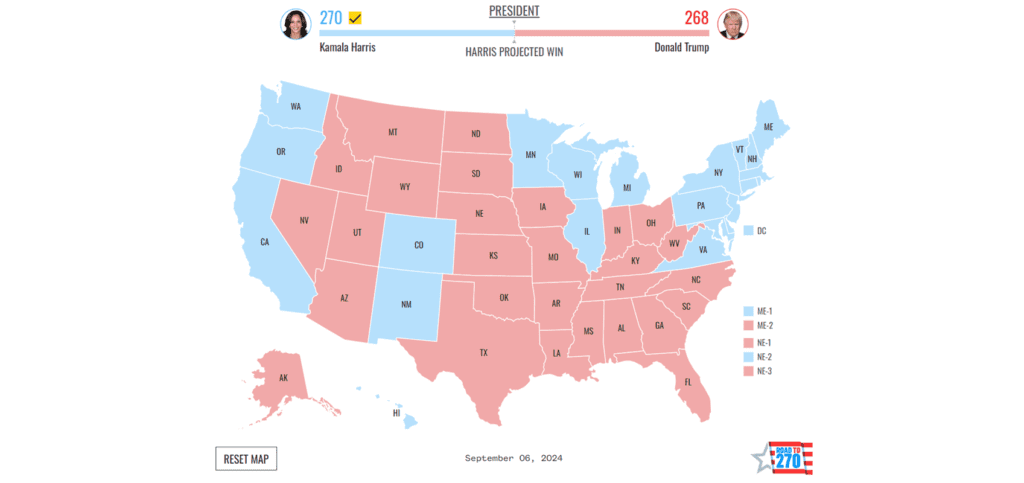
As the 2024 U.S. presidential election approaches, the 2024 US Election stakes are higher than ever, with Americans witnessing unprecedented levels of election anxiety and concern for the future of democracy. This election feels especially high-stakes, and based on my analysis, Vice President Kamala Harris is set to win the presidency. This prediction is supported by Allan Lichtman’s proven “Keys to the White House” model, which has accurately predicted nearly every presidential election outcome since 1984.
Here are the primary factors shaping this year’s historic election.
Voter engagement is already at historic highs for this cycle, with over 55 million votes cast in advance of election day—a remarkable early turnout rate that underscores the urgency many voters feel. In the 2020 presidential election, which had record-breaking participation, about 158 million Americans voted, representing roughly 66.8% of the voting-eligible population. The strong turnout signals that Americans are more engaged than ever, with swing states like Pennsylvania, Michigan, and Wisconsin seeing particularly high early voting rates.
In addition to this surge in early voting, the gender breakdown suggests a turnout advantage for Harris, with women outnumbering men in early votes cast in key states. This trend could prove significant, as women tend to vote Democratic in higher proportions.
Allan Lichtman’s “Keys to the White House” model bases its predictions not on polling data or campaign events but on historical trends and key indicators that have driven electoral outcomes since 1860. The model evaluates 13 factors that reflect the strength of the incumbent party, economic stability, societal conditions, and foreign policy outcomes. It’s a model that has correctly predicted nearly every presidential race since the Reagan era, giving it an edge over volatile polling-based predictions.
For 2024, Lichtman’s keys point toward a Harris victory, bolstered by a favorable early voting turnout and incumbent factors aligning against former President Donald Trump.
There’s a growing consensus among political experts that democracy, once taken for granted in the United States, is increasingly vulnerable. Historically, democracy is fragile; for much of human history, authoritarianism or monarchy has ruled. Only in recent centuries has governance by the people taken hold, and studies show that democracies often fall from within, not from outside invasion.
This year, the fear is that if democratic processes are subverted, America’s democratic fabric may unravel. Election anxiety reflects this concern, with both sides worried that the outcome could shape the nation’s fundamental values for years to come.
The media’s focus on polling has magnified public anxiety, with headlines suggesting a tight race based on fluctuating data. However, the relentless coverage on polling fails to account for fundamental factors that have historically predicted election outcomes.
Lichtman’s “Keys to the White House” model serves as a reminder that long-term performance metrics—not daily polling—are what historically influence election outcomes. While polls capture public opinion at a moment in time, they often overlook the stability that indicators like economic conditions, incumbency, and societal well-being provide in forecasting results.
Former President Trump has a history of divisive language, often directed at minority groups. This rhetoric was evident in recent rallies, where Trump’s allies disparaged significant voting blocs, including Black and Latino Americans. Notably, he has openly repeated derogatory stereotypes, even recently describing Black Americans as “lazy” and “stupid”—language that reinforces historic stereotypes and justifies past discrimination and disenfranchisement. Trump’s rhetoric goes beyond dog-whistle politics, venturing into a realm that directly attacks these communities, with such remarks sparking widespread condemnation.
In this election, the Latino population—the largest minority voting group in the country—has seen particularly harsh rhetoric. This trend may drive Latino voters in states like Arizona, Pennsylvania, and Florida to rally against Trump, potentially impacting the overall outcome.
Concerns about the role of billionaire influence in U.S. politics have risen sharply. Figures like Elon Musk, Peter Thiel, and Jeff Bezos wield outsized financial power, raising questions about how much influence the wealthiest individuals have in shaping election outcomes. Historically, extreme inequality in wealth distribution often correlates with political instability, with the ability of the wealthiest individuals to steer public opinion presenting a threat to the democratic ideal of “one person, one vote.”
The presence of billionaires with the capacity to sway political dynamics is a troubling element that underscores a democratic imbalance, especially when figures like Musk use their platforms to influence political narratives.
In swing states, the early voting gender gap is becoming increasingly significant. As of recent reports, women are voting in higher numbers than men in battleground states like Michigan (56% women, 44% men), Pennsylvania (56% women, 43% men), and Wisconsin (51% women, 43% men). Gender gaps have historically influenced elections, and with women more likely to vote Democratic, this trend could tilt the scales for Kamala Harris in crucial states.
While some states report higher early voting turnout among registered Republicans, a closer look at key states like Pennsylvania, Wisconsin, and Michigan reveals a Democratic advantage, with early ballots favoring Harris in these critical areas. This early turnout data, coupled with the gender trends, aligns with predictions favoring Harris, particularly given that committed early voters tend to stick with their intended candidate.
Based on the “Keys to the White House” model and additional factors like gender-based early voting trends, high overall voter turnout, and divisive rhetoric from the Trump camp, my analysis indicates that Kamala Harris is likely to secure a win in the 2024 presidential election. While media outlets emphasize a close race, historical indicators and early voting trends suggest that Harris has a favorable path to victory.
In this election, the importance of focusing on structural trends over polls cannot be overstated. As Americans head to the polls, they are reminded that democracy is sustained not by rhetoric but by engagement, and that informed voting strengthens the nation’s democratic values.